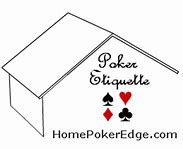HOME POKER ETIQUETTE & RULES
|
HOME POKER GAME ETIQUETTE and RULES
Home poker etiquette involves being aware of and complying with poker rules and customs and behaving as a decent, respectful person. Poker is a social activity as well as a game. Like any game there are rules to be followed. Like any social activity there are behavioral customs and expectations. While observing home poker etiquette and poker rules may not necessarily make you a winning player, it will make you someone who others will enjoy inviting to take part in their home poker games. In home poker games you are usually playing with people who are known to you: friends, acquaintances, neighbors or relatives. Home poker etiquette is, therefore, often less formal. But that does not mean that poker etiquette and rules can be ignored. Here are some of the basic expectations of poker etiquette applied especially for home poker games and tournaments. |
Playing poker in a casino card room is a bit different, so we have added additional considerations for casino poker further down the page. |
BE A CONSIDERATE HOST
Hosting a home poker game is more than setting up a table and playing cards. A considerate host will take steps to ensure his or her guests' comfort. The environment and atmosphere you provide plays a huge role in determining how much your guests enjoy (or do not enjoy) themselves.
Make sure the area you are playing in is clean. This is especially important if you are serving food. A filthy looking environment is a major turn-off.
Clean the table and chairs. Set out side tables so drinks and snacks do not have to be placed on the playing table.
Have clean glasses, plates and utensils available.
Have paper towels, napkins and tissues handy.
Clean the bathroom. Make sure there is soap and clean hand towels (consider buying paper "guest towels"). Put on a full roll of toilet paper and have additional rolls in plain sight.
Make room in the refrigerator for your guests to store any beverages or food they bring.
Designate a spot for coats, etc.
Provide parking instructions to players in advance. Let them know where it is permissible to park and where parking is prohibited in your neighborhood.
Make it obvious on what entrance to your house you want your guests to use. (Put on exterior lighting, etc.)
Inform your guests of the location of the bathroom and if there are other rooms or areas of your home they should not enter.
Keep pets away. Poorly behaved pets that steal food or sniff crotches are repulsive. A cat that insists on jumping onto the table is a major annoyance.
Hosting a home poker game is more than setting up a table and playing cards. A considerate host will take steps to ensure his or her guests' comfort. The environment and atmosphere you provide plays a huge role in determining how much your guests enjoy (or do not enjoy) themselves.
Make sure the area you are playing in is clean. This is especially important if you are serving food. A filthy looking environment is a major turn-off.
Clean the table and chairs. Set out side tables so drinks and snacks do not have to be placed on the playing table.
Have clean glasses, plates and utensils available.
Have paper towels, napkins and tissues handy.
Clean the bathroom. Make sure there is soap and clean hand towels (consider buying paper "guest towels"). Put on a full roll of toilet paper and have additional rolls in plain sight.
Make room in the refrigerator for your guests to store any beverages or food they bring.
Designate a spot for coats, etc.
Provide parking instructions to players in advance. Let them know where it is permissible to park and where parking is prohibited in your neighborhood.
Make it obvious on what entrance to your house you want your guests to use. (Put on exterior lighting, etc.)
Inform your guests of the location of the bathroom and if there are other rooms or areas of your home they should not enter.
Keep pets away. Poorly behaved pets that steal food or sniff crotches are repulsive. A cat that insists on jumping onto the table is a major annoyance.
